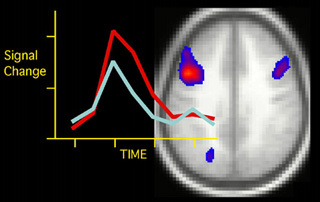Level:
Undergraduate
Instructors:

Past experience tunes the brain such that computational demands are reduced during the processing of previously encountered (blue line) stimuli, compared to novel (red line) stimuli. (Courtesy of Prof. Anthony Wagner.)
Course Highlights
Other than that which is genetically coded, everything we know is derived from and reflects memory for our past experiences. Memory is intimately involved in most, if not all, domains of human cognition, from the ability to temporarily remember a phone number or where you placed your keys to the acquisition of language and the ability to reason. This course surveys the literature on human memory and learning, including consideration of the cognitive and neural organization of memory, the basis of remembering and forgetting, and the nature of false memories. Cognitive theory and behavioral evidence will be integrated with data from neuropsychology and functional brain imaging.
Course Description
Surveys literature on human memory and learning. Focuses on the organization of memory at cognitive and neural levels, the basis of remembering and forgetting, and false memories. Cognitive theory and behavioral evidence are integrated with data from neuro-psychology and neuroimaging.
*Some translations represent previous versions of courses.